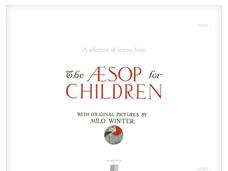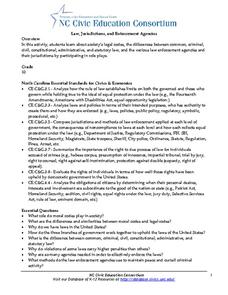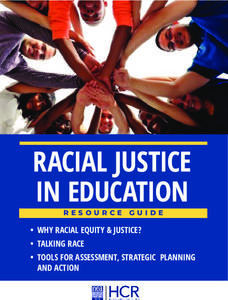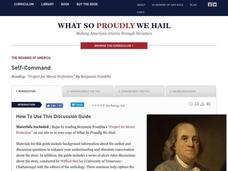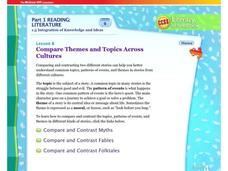Library of Congress
A Selection of Stories from The Æsop for Children
Read and incorporate a variety of Aesop's Fables into a fable genre study with an eBook produced by the Library of Congress. The interactive eBook contains 146 fables written by Aesop and includes colorful interactive illustrations...
Scholastic
Teaching with Aesop's Fables
Bring the applicable morals of Aesop's Fables to your classroom with a series of reading comprehension activities. With 12 different fables with activities and exercises, the packet focuses on the ways learners can apply the fables...
Kentucky Educational Television
What Is Honesty?
This is an absolute must-have resource for exploring honesty with your learners! Youngsters role play four scenarios that involve honest and dishonest actions, and then engage in meaningful discussion and activities regarding those...
Curated OER
Character Traits in Fables
Combining art, music, dance, and reading comprehension, this lesson is geared to reach all ability levels. After reading a variety of fables and discussing story elements and character traits, class members select a moral to use as the...
Carolina K-12
Law, Jurisdictions, and Enforcement Agencies
How do you determine what law enforcement agency has jurisdiction when a crime has been committed? That's the challenge facing class members in this role-play activity.
K20 LEARN
Here's How I Heard It: Using Folklore To Improve Close Reading Skills
"X" is for exaggeration, and "F" is for fact. To encourage close reading and to improve literary analysis skills, class members annotate fables and tall tales, like Paul Bunyan, with symbols that identify key features of this genre.
National Endowment for the Humanities
Themes in Lord of the Flies
William Golding's Lord of the Flies is the anchor text for a lesson that teaches readers how to distinguish between a literary topic and a literary theme. Using the provided worksheets, groups first chart some themes and propose a...
National Education Association
Racial Justice in Education Resource Guide
Strive for racial justice within your classroom community with help from an 80-page resource guide. Five modules move scholars through thoughtful, and reflective grand conversations to making a plan, then taking action. Learners write...
Education Bureau of Hong Kong
Mental Models
Behaviors are often based on assumptions. That's the big idea in the third lesson of a series of critical think resources. Through a series of worksheets, learners examine the conscious and heretofore unconscious assumptions that...
Whole Person Associates
Teen Choices Workbook
The exercises and activities in the 28-page Teen Choices Workbook are designed to provide teens with the tools they need to become thoughtful decision makers, to act responsibly, to reflect on past decisions, and to take responsibility...
Indiana Department of Education
Social Emotional Learning Competencies PK-12 Lesson Plans
Looking for lesson plans that address social and emotional learning competencies? Here's help in the form of a 166-page packet that includes lesson plans for elementary, middle, and high school learners. Seven detailed plans are provided...
American Museum of Natural History
Silk Road Fables
Talk about rabbit holes! With just this one resource, learners can travel the Silk Road listening to fables, meet a scientist who studies poisons (and whose favorite book is Alice in Wonderland), and listen to a video interview of an...
Victoria Theatre Association
The Ugly Duckling Resource Guide
Our differences aren't meant to divide us! Use Hans Christian Andersen's classic tale "The Ugly Duckling" to reinforce the concept that appearances don't define someone's character, and that there is always somewhere where we belong.
Curated OER
“Everyone Else Does It!” Ethics Project
Do you have good ethics? How about good morals? Scholars investigate the role business ethics, morals, and values play in society. Through role play, group work, and readings, they uncover the basis behind the importance of being...
Biz Kids
Understanding Business Ethics
After screening an episode by BizKids, scholars show what they know about business vocabulary, then take part in grand conversations about role models and ethical dilemmas.
PBS
Family History: Those with Lofty Ideals
Would you stand up for your beliefs, no matter the cost? Scholars investigate their own families to uncover examples of how and when someone stood up for their ideals. Using video clips, interviews, and eulogies, they come to understand...
Fluence Learning
Writing an Opinion: Is Pride Good or Bad?
Does pride really goeth before the fall, or can it be essential to one's development? Second graders read two of Aesop's fables that refer to pride in their morals, and write a short essay about whether pride is good or bad, based on...
What So Proudly We Hail
The Meaning of America: Self-Command
Even for one of the most accomplished men in American history, there was room for improvement. Challenge high schoolers to use Benjamin Franklin's Project for Moral Perfection to analyze text, make inferences, connect to historical...
What So Proudly We Hail
A Lesson on Benjamin Franklin’s “Project for Moral Perfection”
Benjamin Franklin identified 13 virtues that he felt would strengthen his character if he could focus on each one. A thorough lesson explores high schoolers' personal values in the context of their lives, and compels them to strive for...
K5 Learning
The Wolf
Fourth graders have likely heard the expression to cry wolf, but they may not know the saying's origin. A short reading passage tells the story and includes four comprehension questions for pupils to demonstrate their...
K5 Learning
Androclus and the Lion
Kindness is never a standalone act. Fourth graders read the classic tale of Androclus and his act of service to the lion, which is repaid to him by the lion in a Roman colosseum. After reading the passage, they answer four comprehension...
McGraw Hill
Compare Themes and Topics Across Cultures
Compare and contrast folktales, myths, and fables in an interactive eBook. The interactive is broken up into three topics: myths, fables, and folktales. Each section includes a reading passage and a guided lesson on the theme, topic, and...
English Worksheets Land
The Donkey, the Fox and the Lion
Have learners read about a lion that lures a foolish fox into a trap and gets himself and his donkey friend eaten. After reading, pupils answer three questions and determine what the lesson of the story is.
Read Works
The Boy Who Cried Wolf
Reinforce reading comprehension strategies and contemplate an important life lesson with a learning exercise featuring Aesop's fable, The Boy Who Cried Wolf. After reading a brief passage, scholars show what they know by...


